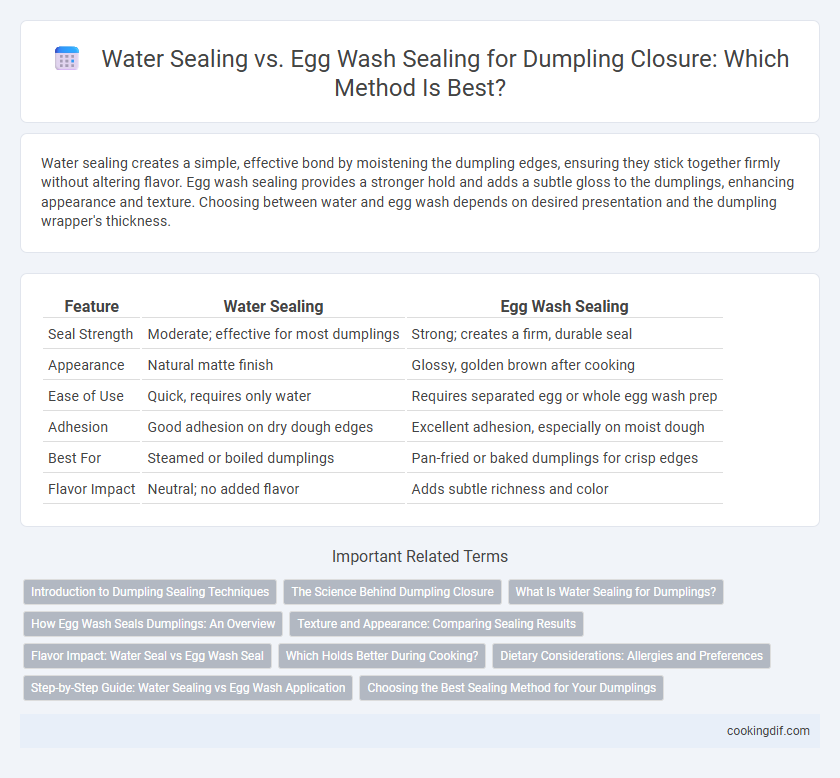Water sealing creates a simple, effective bond by moistening the dumpling edges, ensuring they stick together firmly without altering flavor. Egg wash sealing provides a stronger hold and adds a subtle gloss to the dumplings, enhancing appearance and texture. Choosing between water and egg wash depends on desired presentation and the dumpling wrapper's thickness.
Table of Comparison
| Feature | Water Sealing | Egg Wash Sealing |
|---|---|---|
| Seal Strength | Moderate; effective for most dumplings | Strong; creates a firm, durable seal |
| Appearance | Natural matte finish | Glossy, golden brown after cooking |
| Ease of Use | Quick, requires only water | Requires separated egg or whole egg wash prep |
| Adhesion | Good adhesion on dry dough edges | Excellent adhesion, especially on moist dough |
| Best For | Steamed or boiled dumplings | Pan-fried or baked dumplings for crisp edges |
| Flavor Impact | Neutral; no added flavor | Adds subtle richness and color |
Introduction to Dumpling Sealing Techniques
Water sealing involves lightly moistening the edges of the dumpling wrapper to create a strong bond that prevents filling leakage during cooking, making it a simple and effective method commonly used for traditional Asian dumplings. Egg wash sealing uses beaten egg as an adhesive, providing a richer flavor and a slightly crisp texture to the dumpling edges, often preferred in recipes requiring a golden finish after frying or baking. Choosing between water sealing and egg wash sealing depends on the desired texture, cooking method, and flavor profile of the dumpling.
The Science Behind Dumpling Closure
Water sealing creates a thin, sticky surface by hydrating the flour proteins and starches, promoting strong adhesion between the edges of dumpling wrappers. Egg wash sealing, rich in proteins and lipids, forms a firmer and more elastic bond that also adds a glossy finish after cooking. The choice of sealing method influences the dumpling's texture, durability during steaming or frying, and overall presentation based on the molecular interactions involved.
What Is Water Sealing for Dumplings?
Water sealing for dumplings involves using a small amount of water to moisten the edges of the dumpling wrapper before pressing them together, creating a strong adhesive bond that prevents filling from leaking during cooking. This method is preferred for achieving a tight, secure closure without altering the dumpling's texture or flavor. Unlike egg wash sealing, water sealing maintains the dumpling's delicate wrapper integrity while providing sufficient stickiness to hold the dumpling closed.
How Egg Wash Seals Dumplings: An Overview
Egg wash creates a strong, adhesive seal on dumpling edges by forming a sticky layer of protein and moisture that binds the dough together during cooking. This method enhances the dumpling's structural integrity, preventing filling leakage and ensuring a uniform crispness or gloss on the surface. Compared to water sealing, egg wash provides a more durable closure and adds a golden-brown finish, improving both texture and visual appeal.
Texture and Appearance: Comparing Sealing Results
Water sealing creates a smoother, more natural-looking dumpling edge with a soft texture that remains tender after cooking. Egg wash sealing forms a firm, glossy seal that adds a slight crispness and enhances visual appeal with a golden sheen. Dumplings sealed with egg wash tend to retain their shape better during frying or baking, while water-sealed dumplings often exhibit a chewier texture ideal for steaming.
Flavor Impact: Water Seal vs Egg Wash Seal
Water sealing dumplings offers a subtle, neutral finish that preserves the dumpling's original flavor, allowing the filling's taste to stand out without interference. Egg wash sealing imparts a richer, slightly savory note due to the protein and fat content in the egg, enhancing the overall flavor complexity and giving the dumplings a golden, appetizing crust. Choosing between water and egg wash sealing significantly affects the dumpling's taste profile, with egg wash adding depth and visual appeal, while water maintains a clean, delicate flavor experience.
Which Holds Better During Cooking?
Water sealing creates a moisture-based adhesive that softens the dumpling dough edges, allowing them to bond tightly and maintain a strong seal during boiling or steaming. Egg wash sealing forms a protein-rich barrier that crisps and hardens when cooked, offering a firmer closure ideal for pan-frying methods. For wet cooking techniques, water sealing generally holds better, while egg wash sealing provides superior adhesion for frying or baking dumplings.
Dietary Considerations: Allergies and Preferences
Water sealing for dumpling closure offers a safe alternative for individuals with egg allergies or dietary restrictions such as veganism, eliminating concerns related to animal products. Egg wash sealing enhances browning and flavor but may trigger allergic reactions in sensitive individuals due to egg proteins. Choosing the appropriate sealing method depends on dietary preferences and allergy considerations to ensure both safety and taste.
Step-by-Step Guide: Water Sealing vs Egg Wash Application
Water sealing for dumplings involves moistening the edges with a small amount of water to create a sticky surface that helps the dough adhere firmly during cooking, ensuring a tight closure. Egg wash sealing requires lightly brushing the dumpling edges with beaten egg, which acts as a strong adhesive and adds a glossy finish after cooking. For best results, gently press the sealed edges together immediately after application, avoiding excess liquid to prevent dough sogginess or sealing failure.
Choosing the Best Sealing Method for Your Dumplings
Water sealing creates a strong, flexible bond by hydrating the dough edges, ideal for delicate wrappers prone to tearing during cooking. Egg wash sealing forms a sticky, golden crust that enhances appearance but may harden, making it less suitable for thinner dumplings. Choosing between water and egg wash depends on wrapper thickness and desired texture, with water seal preferred for softness and egg wash for a glossy finish.
Water sealing vs egg wash sealing for dumpling closure Infographic

 cookingdif.com
cookingdif.com